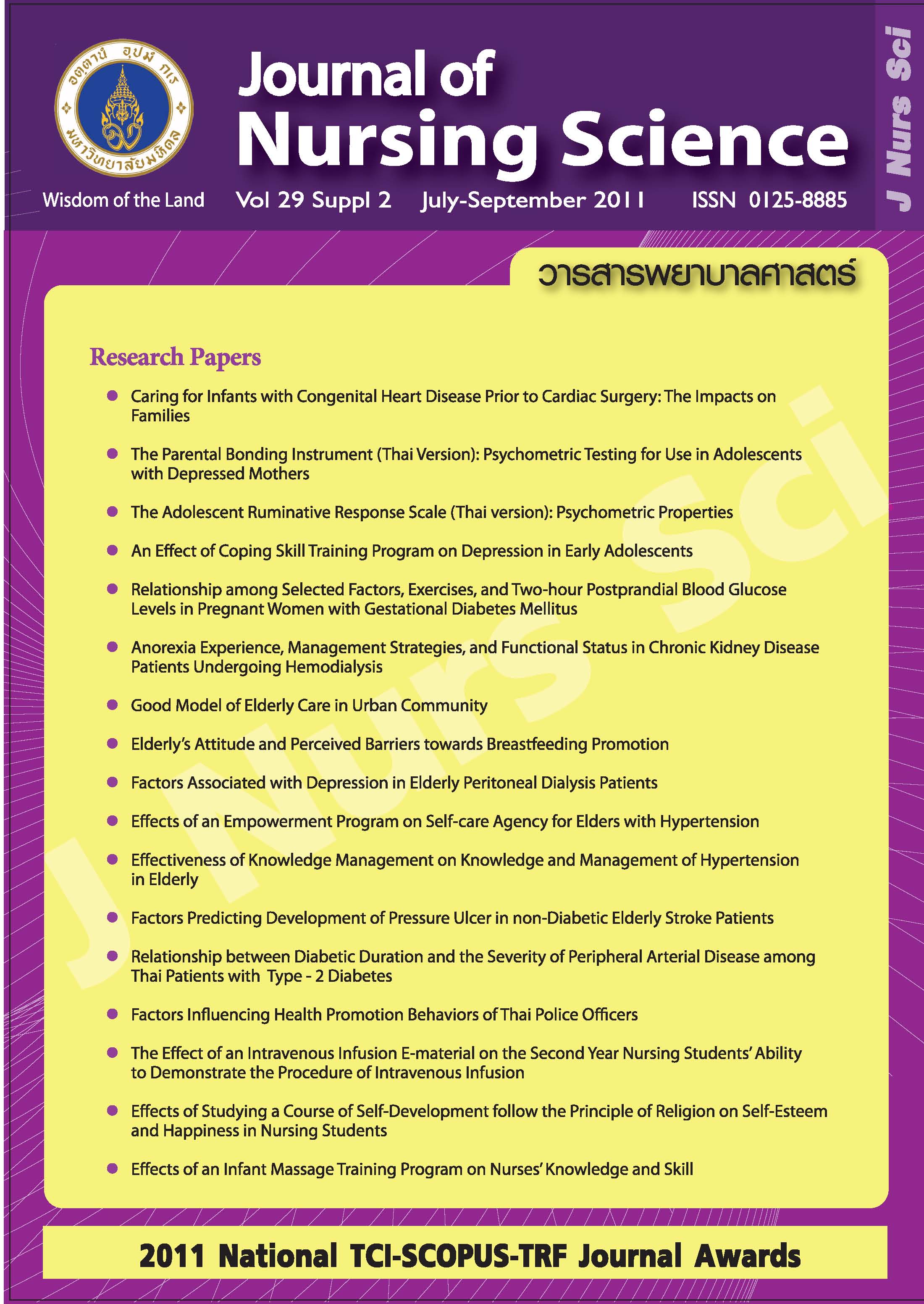An Effect of Coping Skill Training Program on Depression in Early Adolescents
Main Article Content
Abstract
Purpose: To examine an effect of a coping skill training programon depression in early adolescents.
Design: Experimental research.
Methods: The study group consisted of 30 Mathayomsuksa 2 (8thgrade) students from a school in Chantaburi Province. They wererandomly assigned into an experimental group and a controlgroup, with 15 students each. Before the experiment, all 30subjects were assessed to complete the Children’s DepressionInventory. The experimental group then received the coping skilltraining program twice a week for 11 sessions. Each session lasted60-90 minutes. On the other hand, the control group received theusual care provided by the school. Both groups of subjects wereassessed to determine their depression again at post-interventionimmediately, one-month, and three-month follow-ups. Thedepression scores elicited from the subjects in the experimentalgroup were analyzed to compare the differences of mean scoresbetween pre and post – intervention and to compare thedifference of mean scores of depression between the experimentaland the control groups using a repeated-measures ANOVA.
Main findings: The findings revealed that the mean score ofdepression of the subjects in the experimental group at postinterventionimmediately, one-month follow- up and threemonthfollow- up was lower than that at pre-intervention with astatistical significance (p < .001). Moreover, the mean score ofdepression of the subjects in the experimental group was lowerthan in the control group at three points of time: postintervention,one-month follow-up and three-month follow- upwith a statistical significance (p < .01, p < .01, and p < .05,respectively).
Conclusion and recommendations: Based on the study findings,it is recommended that healthcare personnel who are involvedwith mental health care of adolescents should use the coping skilltraining program to prevent or reduce depression amongadolescents. Training should also be provided to equip theadolescents with skills to deal with negative thought as well asvarious stress management skills to enable them to effectivelycope with stress and prevent them from depression.
Article Details
Copyright Notice: Nursing Science Journal of Thailand has exclusive rights to publish and distribute the manuscript and all contents therein. Without the journal’s permission, the dissemination of the manuscript in another journal or online, and the reproduction of the manuscript for non-educational purpose are prohibited.

Disclaimer: The opinion expressed and figures provided in this journal, NSJT, are the sole responsibility of the authors. The editorial board bears no responsibility in this regard.
References
World Health Organization. The global burden of disease: 2004 update. Switzerland: World Health Organization; 2008.
World Health Organization. Prevention of mental disorders: effective interventions and policy options: summary report. France: World Health Organization; 2004.
World Health Organization. Mental Health Policy and Service Guidance Package: Child and Adolescent. Geneva: World Health Organization; 2005.
Yorbik O, Birmaher B, Axelson D, Williamson DE, Ryan ND. Clinical characteristics of depressive symptoms in children and adolescents with major depressive disorder. J Clinic Psychiat. 2004;65(12):1654-9; quiz 760-1.
Dunn V, Goodyer IM. Longitudinal investigation into childhood and adolescence-onset depression: psychiatric
outcome in early adulthood. Br J Psychiat. 2006;188(3):216-22.
Essau CA. Course and outcome of major depressive disorder in non-referred adolescents. J Affect Disorders. 2007;99 (1-3):191-201.
Zisook S, Lesser I, Stewart JW, Wisniewski SR, Balasubramani GK, Fava M, et al. Effect of Age at Onset on the Course of Major Depressive Disorder. Am J Psychiat. 2007;164(10):1539-46.
Lewinsohn PM, Rohde P, Seeley JR, Klein DN, Gotlib IH. Natural course of adolescent major depressive disorder in a community sample: predictors of recurrence in young
adults. Am J Psychiat. 2000;157(10):1584-91.
Pettit JW, Lewinsohn PM, Roberts RE, Seeley JR, Monteith L. The long-term course of depression: development of an empirical index and identification of early adult outcomes. Psychol Med. 2009;39(3):403-12.
Reinherz HZ, Paradis AD, Giaconia RM, Stashwick CK, Fitzmaurice G. Childhood and Adolescent Predictors of Major Depression in the Transition to Adulthood. Am J Psychiat. 2003 December 1, 2003;160(12):2141-7.
Dundon EE. Adolescent Depression: A Metasynthesis. J Ped Health Care. 2006;20(6):384-92.
Trangkasombat U, Likanapichitkul D. Depression in junior high school students in the Bangkok metropolis. Journal of the Psychiatric Association of Thailand.
;41(3):162-73. (in Thai)
Sukanich P. Depression in Children & Adolescents Journal of the Psychiatric Association of Thailand. 1997;42(1):35-49.
Klein DN, Lewinsohn PM, Rohde P, Seeley JR, Olino TM. Psychopathology in the adolescent and young adult offspring of a community sample of mothers and fathers
with major depression. Psychol Med. 2005;35(3):353-65.
Merry S, McDowell H, Wild C, Bir J, Cunliffe R. A randomized placebo-controlled trial of a school-based depression prevention program. J Am Acad Child Adolesc Psychiat 2004;43(5):538-47.
Stice E, Shaw H, Bohon C, Marti CN, Rohde P. A meta-analytic review of depression prevention programs for children and adolescents: factors that predict
magnitude of intervention effects. J Consult Clin Psychol. 2009;77(3):486-503.
Lewinsohn PM, Clarke GN, Hops H, Andrews J. Cognitive-behavioral treatment for depressed adolescents. Behavior Therpy. 1990;21:385-401.
Clarke GN, Hawkins W, Murphy M, Sheeber L, Lewinsohn PM, Seeley JR. Targeted prevention of unipolar depressive disorder in an at-risk sample of high school adolescents: a randomised trial of a group cognitive intervention. J Am Acad Child & Adolescent Psychiat. 1995;34:312-21.
Department of Mental Health, Ministry of Public Health. Strategic Planning, Department of Mental Health in the last phase of the Tenth of National Economic and Social Development Plan (BE. 2007 – 2011). Nonthaburi: Lamom; 2009. (in Thai).
Cummings NA, Cummings JL, William TOD, Nicholas AC. 3 - Psychoeducation in Conjunction with Psychotherapy Practice. Evidence-Based Adjunctive Treatments. San Diego: Academic Press; 2008. P. 41-59.
Trangkasombat U, Likanapichitkul D. Depressive Symptoms in Children: A Study Using The Children’s Depression Inventory. 1996;41(4):222-34. (in Thai)
Cuijpers P, Munoz RF, Clarke GN, Lewinsohn PM. Psychoeducational treatment and prevention of depression: the “Coping with Depression” course thirty years later. Clinic Psychol Rev. 2009;29(5):449-58.
Vitiello B. Prevention and treatment of child and adolescent depression: challenges and opportunities. Epidemiol Psychiatr Sci. 2011;20(1):37-43.


